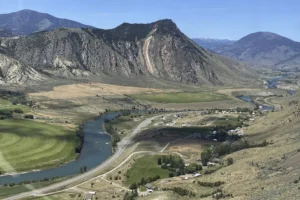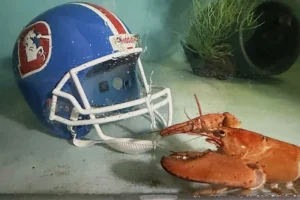District Court in Wyoming Tapped to Review Decades-Long Tribal Hunting Rights Dispute
Impact of statehood on hunting rights a key question
- Published In: Other News & Features
- Last Updated: Jul 29, 2023

Pictured above is the Byron White Courthouse, where the U.S. Court of Appeals for the Tenth Circuit is located. This court serves as an intermediate appellate court between the U.S. Supreme Court and the district courts. (Courtesy photo from the U.S. Court of Appeals for the Tenth Circuit’s website)
By Shen Wu Tan
Special to the Wyoming Truth
More than a century later, a hunting rights treaty with the Crow Tribe from the 1800s is facing renewed scrutiny in the courts.
The Crow Tribe is asking the court to relinquish the decision of Crow Tribe of Indians v. Repsis, which ruled that Wyoming’s admittance as a state nullified the tribe’s treaty hunting rights on “unoccupied lands,” including in the Bighorn National Forest, and to abide by the 1868 treaty.
The case was sent back from an appeals court to a U.S. district court in Wyoming, according to an opinion published earlier this week.
The origins of the tribal hunting rights dispute dates to 1989 when Thomas Ten Bear, a member of the Crow Tribe, was hunting on the reservation grounds in Montana. He crossed a section of the Bighorn National Forest in Wyoming and shot and killed an elk. The state of Wyoming charged and convicted Ten Bear for killing an elk on national forest lands without a hunting license.
The Crow Tribe then sued the Wyoming Game and Fish Department in 1992, taking the case to the Tenth Circuit and seeking a declaratory judgment that Ten Bear had a right to hunt there under the 1868 treaty with the tribe. The tribe argued the treaty permitted hunting rights on “unoccupied lands” in the U.S. and allowed an unrestricted right to hunt in the Bighorn National Forest. But the federal court ruled in Crow Tribe of Indians v. Repsis in 1994 that Wyoming’s establishment as a state nullified the treaty.
The U.S. Court of Appeals for the Tenth Circuit on Monday ruled that the district court “abused its discretion” when it claimed it lacked power to review the tribe’s request for relief. However, the appeals court denied granting relief in the hunting rights case, claiming the district court was “better positioned,” the court opinion states.
“Accordingly, we vacate the district court’s decision and remand the case for further proceedings,” Chief Judge Jerome Holmes wrote in the 30-page opinion. “…We conclude the district court had the authority to review the Tribe’s motion for post-judgment relief—specifically, insofar as that motion implicated the Occupation Rationale and the Conservation Necessity Rationale…. Moreover, the district court’s ability to make specific findings will in turn provide us with a crystalized record of the district court decision, so we may be better situated to evaluate it in the event of future appeals.”
Senior Judge Mary Beck Briscoe and Judge Nancy Moritz joined Holmes in the opinion.
In 1995, the Tenth Circuit Court of Appeals affirmed the district court’s decision in Crow Tribe of Indians v. Repsis although it ruled that the Bighorn National Forest was “occupied,” meaning the treaty hunting rights did not apply. The appeals court also decided Wyoming had justifiable conservation reasons for hunting restrictions.
Fast forward to 2019. The U.S. Supreme Court ruled in Herrera v. Wyoming, where the state attempted to prosecute a tribe member named Clayvin Herrera for hunting elk in the forest off-season and without a license, that Wyoming’s admittance as a state had not terminated the Crow Tribe’s treaty rights. It also ruled that the national forest was not “occupied.” Due to two different rulings, the Court sent the case back to the Wyoming courts, where the state kept pursuing its efforts to prosecute the tribe member.
In response, the Crow Tribe sought relief, a motion denied by the district court. The district court held that it lacked the authority to grant post-judgement relief, and the tribe appealed.
Wesley James Furlong, a staff attorney for the Native American Rights Fund, which is representing the Crow Tribe, told the Wyoming Truth, “Herrera v. Wyoming affirmed that the Crow Tribe’s treaty-reserved right to hunt in the Big Horn National Forest remained intact. Wyoming is bound by the 1868 Treaty and the Supreme Court’s decision in Herrera. This case will allow the Crow Tribe to correct the injustice of the Repsis decisions — which said that their right to hunt was extinguished — and prevent the State of Wyoming from using these outdated decisions to prevent Crow Tribe members from asserting their treaty rights as a defense to unlawful state prosecutions.”
The Crow Tribe could not be reached for further comment on this case.
The Crow Tribe, a federally recognized Native American tribe with origins in present-day Montana and Wyoming, signed a treaty with the government in 1868 in which it agreed to settle on a reservation in Montana near Wyoming and the Bighorn National Forest, halting its nomadic lifestyle. In exchange, the tribe was granted the right to hunt on the unoccupied lands if game was found there and if peace continued between whites and Native Americans on the borders of hunting districts.
Wyoming Attorney General Bridget Hill, whose office represents the defendant Wyoming Game and Fish Department, declined to comment on the case and told the Wyoming Truth, “[b]ecause this case is still pending, I am unable to answer your questions.”
The Wyoming Game and Fish Department also declined to answer additional questions about the ongoing litigation.
“However, despite the ongoing case, we continue to believe that finding agreement through negotiation can be a more positive and productive path forward than the current status quo,” said Breanna Ball, the department’s public information officer. “We will continue to work with the tribes to ensure healthy populations of big game remain in Wyoming, as well as to uphold the long-standing systems of game management in Wyoming.”













